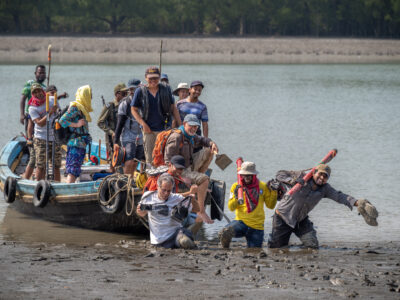
Nirupam Bajpai is leading a team of Earth Institute experts along with faculty from the Indian Institute of Management at Ahmedabad to help scale-up the provision of essential services such as health care and education, among others, in some of the most underserved areas of India. As Senior Development Adviser and Director of the South Asia Perogram at the Center on Globalization & Sustainable Devlopment, part of The Earth Institute, Bajpai is engaging with both local and national officials to lock in commitment to help the poorest of the country have access to the critical services they need. Recently, he met with the President of India, A.P.J. Abdul Kalam, to discuss key findings and recommendations.
Q: What is the current phase of your work in India?
A: Currently, we are working in the state of Rajasthan as part of our Year II work on this project entitled, Scaling up Services in Rural India. We’re working in the areas of primary health, primary education, energy and drinking water. With regard to the health and education components of this project, we’re currently in the process of administering questionnaires to rural households and to the employees in the health centers and schools in Chittorgarh and Jalore districts of Rajasthan. In the energy and water sectors, data from the Census of India is being analyzed and field work undertaken.
In the health sector, we’re finding that the rural primary healthcare system in our selected districts in particular, and in the rural areas of the state is, for the most part, dysfunctional. The current health system in place is inefficient and delivers very low quality health services, so much so that the private sector has become the de facto provider of health services in the rural areas of the state. Of course, we found similar results during our work in the states of Madhya Pradesh and Uttar Pradesh in the first phase of work as well.
Q: What have been the primary challenges?
A: One of the major problems in the health sector is that public health spending of the health departments of federal and state governments is very low. Overall, we believe it should rise from the 2004/05 level of 0.9 percent of GDP (federal government 0.29 percent and state governments 0.61 percent) to 3 percent of GDP by the year 2009. Additionally, there is a major problem of ensuring that medical and paramedical personnel reside within the villages that need their services. In a number of instances, during our unannounced field visits, we did not find any doctors at the primary health centers.
In the education sector, the conditions are somewhat better in terms of coverage and the provision of mid-day meals to students. Enhanced infrastructure and increases in the number of primary schools (within one kilometer distance from most villages) has occurred throughout Rajasthan, except of course for parts of the state where there is only desert.
One major obstacle is the low quality of teaching in public schools, which contributes to parental apathy towards sending their children to school even when they recognize the importance of education. Widespread teacher absenteeism and teacher apathy comes out very strongly in our surveys which we conducted to better understand the teaching-learning processes. For instance, during our field visits we found that there was no teaching going on in half the sample schools we visited, a problem further compounded by dismal infrastructure, overcrowded classrooms and lack of teaching materials and resources. Many schools have only two rooms, a single teacher, no access to drinking water, and a single toilet for both boys and girls. We are currently working on ways to address these challenges in the most effective way possible.
Q: You recently met with the President of India, Dr. A.P.J. Abdul Kalam to discuss the key findings and recommendations of your work. What specifically did you and the President discuss?
A: President Kalam invited me to discuss the key findings and recommendations from our Madhya Pradesh and Uttar Pradesh Reports. The President and I discussed a number of recommendations that our reports have made in regard to public spending, especially in the health sector—ways to strengthen the control and oversight of health centers and schools; ways to better utilize the federal spending on rural schools via the scheme called Sarva Shiksha Abhiyan (Education for All); and revisions in syllabus and contents of textbooks used in mathematics, English and environment studies.
President Kalam and I also briefly discussed the broad strategies recommended by our UN Millennium Project and our experiences working in the Millennium Village in Sauri, Kenya. The President expressed his strong interest in our village-level work in rural India and described his own vision of rural development, which he calls Providing Urban Amenities in Rural Areas (PURA). The President agreed with the broad strategies that we’ve recommended and referred our reports to the concerned government ministries for follow-up action.
Q: What is your opinion about the commitment and political will of the government to assist your work and ensure that the most vulnerable get the services they need?
A: Undoubtedly, the federal government led by Prime Minister Dr. Manmohan Singh is strongly committed to India’s rural development. For instance, in the health sector, the Prime Minister launched the National Rural Health Mission (NRHM), which aims to: increase public expenditure on health, reduce regional imbalance in health infrastructure, pool resources, decentralize district management of health programs, increase community participation and ownership of assets, and operationalize community health centers into functional hospitals to meet Indian Public Health Standards.
Similarly, in the education sector, the government has been strengthening the “Education for All” plan by significantly raising its outlays each year and improving the coverage and quality of mid-day meals being provided in public schools.
Our reports have been utilized by the concerned ministries of the federal government, the Planning Commission, and the state governments of Madhya Pradesh and Uttar Pradesh in order to increase public spending and to introduce measures to improve the quality of services being provided.
Q: Will you expand your work to other states?
A: Yes, we certainly want to expand our work into Andhra Pradesh and Karnataka and in Bihar as well. We’re in discussions with The William and Flora Hewlett Foundation who had very kindly given us the grant for this project and we hope that they will support the project’s Phase II as well.



